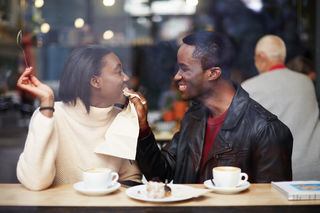Beauty
Grooming Bugs: Why Others' Imperfections Distract Us
Why are we so bugged by seeing crumbs on others' faces, and other imperfections?
Posted October 26, 2018

Why do certain sights bug us so much? I’m thinking here of sights like the following: (1) someone with a dab of mustard on their cheek; (2) someone with a crumb in their beard; (3) someone with a shirt tag showing; and (4) someone whose shirt tail is sticking out.
Not all of these sights bug everyone, of course. The last one — the shirt tail sticking out of someone’s pants — doesn’t bug people hipper than me. I’m of an age, training, and temperament that shirt tails appearing where I learned they shouldn’t rile me, though I’ve gotten less irritated by this sight as it has become more common.
Whether I could ever feel totally relaxed while having a conversation with someone who has a dab of mustard on their cheek, I don’t know. Similarly, you might never feel totally relaxed trying to talk with someone whose mascara is running down their cheek.
When faced with such distractions, you may find it impossible to concentrate on the discussion. Such sights probably bug you, as they do me. Sometimes you may try to help people who are unaware of the unflattering picture they present. You may use a direct verbal declaration to help them, as in, “Greta, you’ve got some ice cream on your sweater.” Or you may use a less direct statement, like “Gerda, it’s snowing down South.” The latter quote is what one lady might have said to another at a cocktail party many decades ago to communicate, as discreetly as possible, that the woman being apprised of the snow is suffering from a slip showing beneath the hem of her skirt. Another remark, similar to the last one, may refer to snowflakes up North, which is code for, “You’ve got dandruff on your shoulder.”
Instead of giving verbal signals to others, you may use nonverbal cues. You may stare at trouble sites, perhaps nodding at them demonstratively. Or you may engage in behaviors that would eliminate the problem.
Suppose your housemate has just come down from the attic with a bit of spider web hanging from her eyebrow. She is about to speak with a guest whom she would really like to impress. You might give a gentle swipe to your own eyebrow to show what needs be done so your housemate can save face. The swipe needs to be carried out conspicuously enough to be noticed by your housemate, but not so conspicuously that the visitor sees that your housemate needs help with hygiene.
These examples point to deep social bonds. We use discreet remarks and discreet gestures to save others from embarrassment. Declaring at the top of your lungs that someone has a bugger dangling from their nose does them no good. On the other hand, asking if they have a sniffle may suffice to get them to attend to their proboscis.
Two areas of research come to mind in thinking about this kind of behavior. One is the study of mirror neurons. These are cells that fire when individuals observe others doing things they can do themselves. Mirror neurons were discovered during recordings of brain cells in macaque monkeys. When the macaques saw others eat bananas, cells in the macaques' brains fired. The cells of special interest were the ones that fired if and only if the actions that were observed could also be performed by the macaques.
Mirror neurons are relevant here, because they provide a medium by which nonverbal actions designed to signal needed acts can elicit those acts. Observing someone wipe their nose is likely to elicit nose wipes if neural circuitry exists that supports the communication between the observed and required action.
The other area of research that comes to mind relates to grooming. If you groom someone — say, by combing and braiding their hair — that is an act of social support. Grooming may help others handle personal hygiene in ways that go beyond what they can do themselves. But grooming also prepares the other person for presentation to others. The most elaborate form of grooming occurs before proms and weddings. Primping of prom-goers and of brides and grooms by parents, siblings, friends, and hired hands increases the attractiveness of the “primpees” for those they'll be meeting.
Why, then, do we feel bugged by the sight of momentary imperfections in others? I speculate that it’s because we feel compelled to help our confrères be more attractive. If we were not bothered by others’ imperfections, we’d ignore their flaws, which wouldn’t be bad if no else cared about them either. But there’s likely to be a special benefit for a species that not only prizes innate beauty — genetically bestowed clear skin, lustrous hair, and the rest — but also strives for the beautification of others. Grooming requires cooperation, trust, and, in some cases, a modicum of technology. Those who comb, brush, and clip their confreres presumably act in a way that tends to promote the continuation of their own gene pool.
Doubtless, some people are more tuned to these matters than others, and, of course, not everyone is equally happy to be told or signaled that their fly is open or their blouse is unbuttoned. Tact is required in deciding when to act and when to stay quiet. Holding back to avoid offending others when one just wants to help is a social challenge in and of itself.
The choices we make and the thought we put into those choices point to how socially minded we are as a species. Variation in how well we do at the choosing is to be expected as part of natural selection. Some of us are better than others, both in determining when to signal problems and whether or when to receive those signals. As a whole, we try to do the best we can, warts and all.




